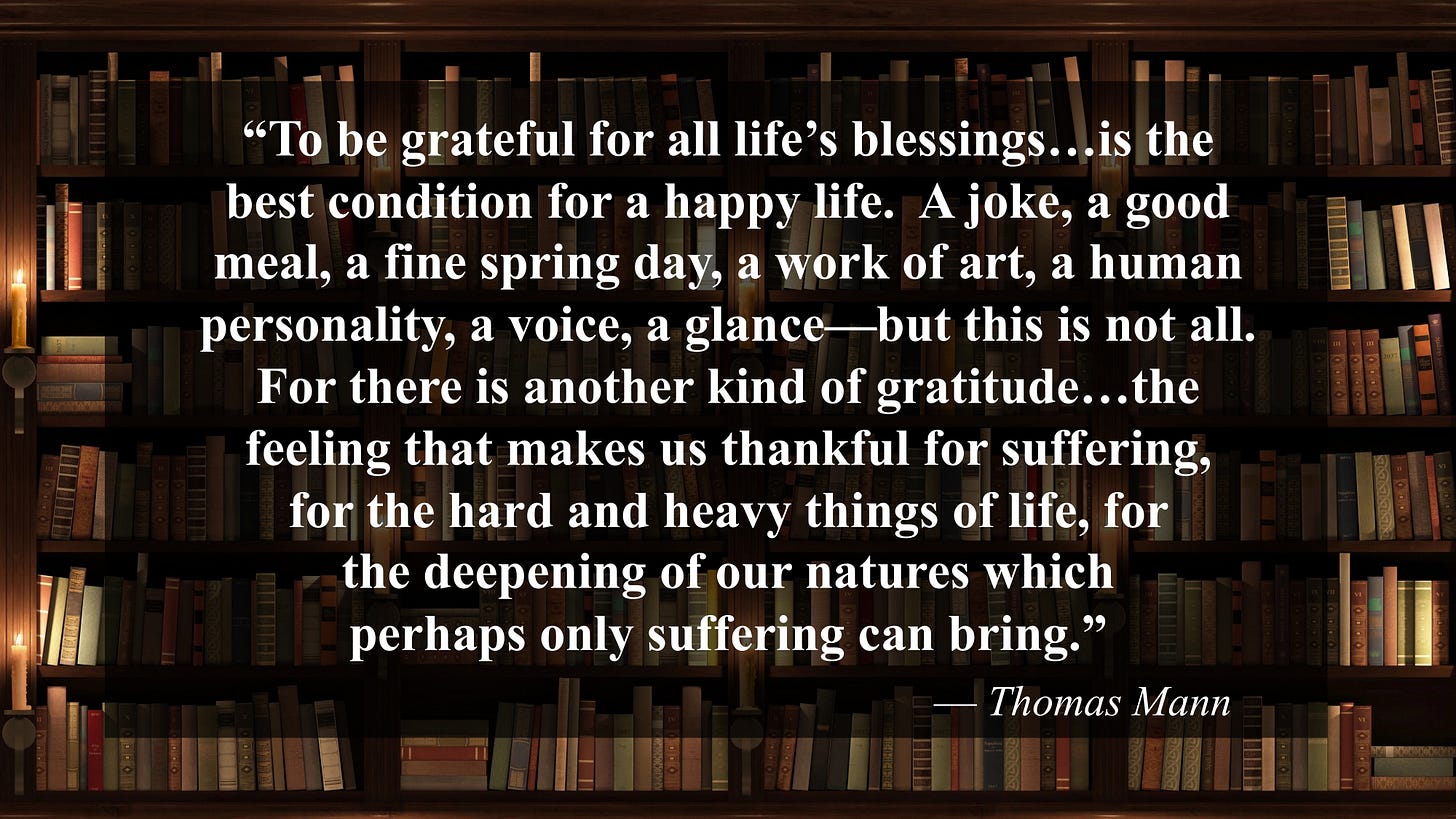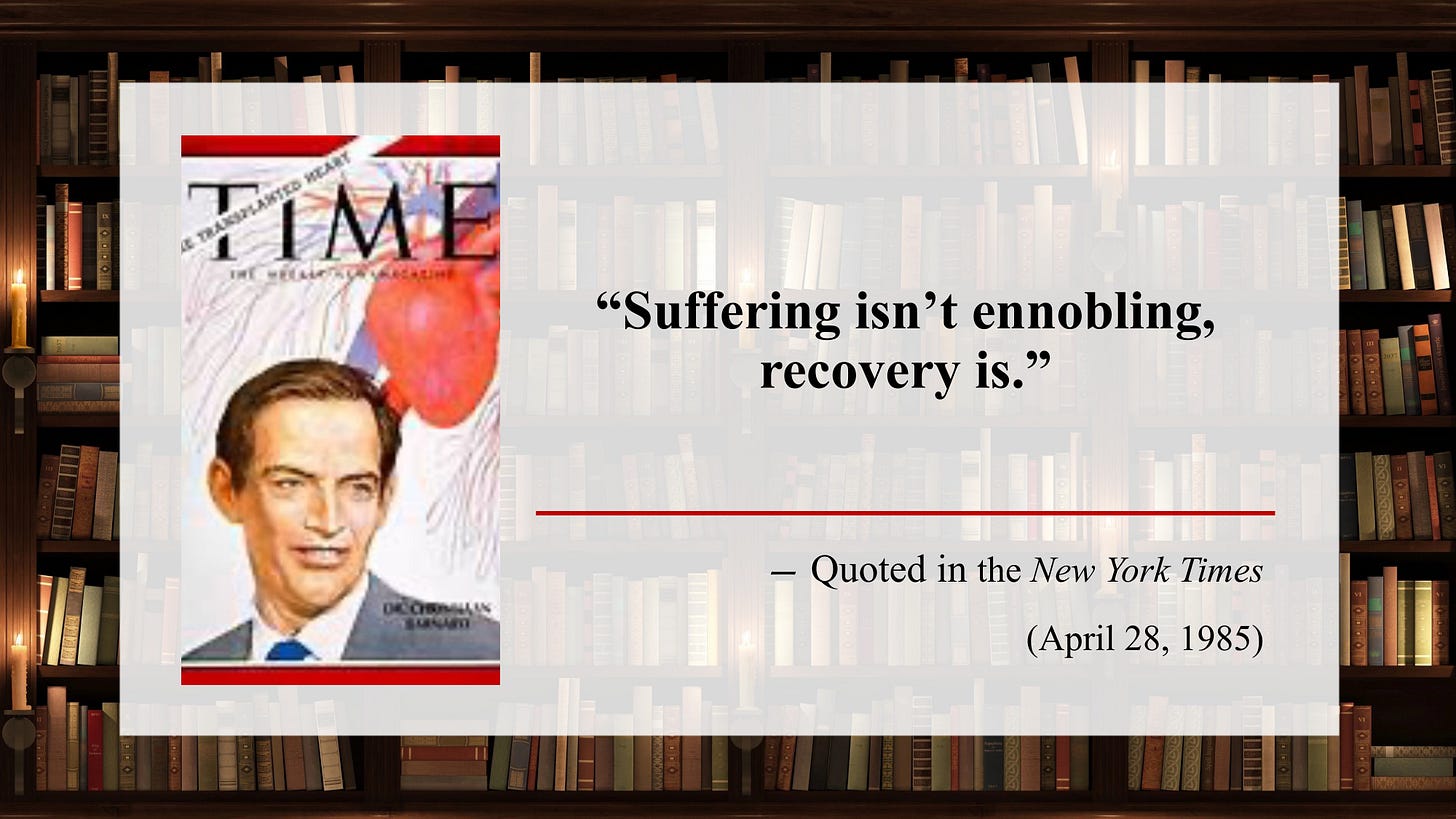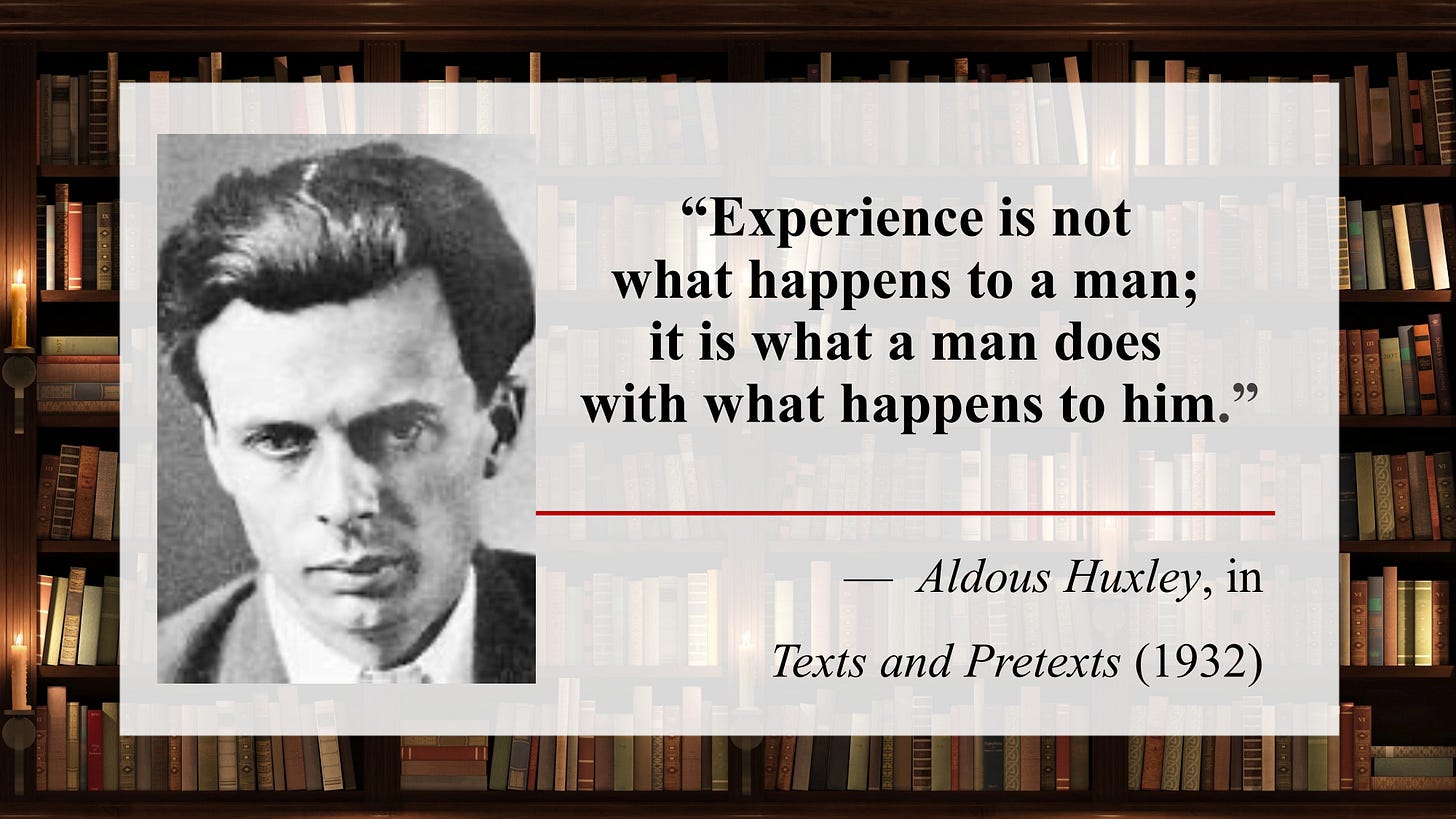Dr. Mardy's Quotes of the Week ("Recovery & Beyond")
March 2-8, 2025 | THIS WEEK'S THEME: “Recovery & Beyond"
In Two Words, I’m Grateful!
As I write this 48 hours after my TAVR procedure, I feel like I’ve been given a new lease on life. I’m still a little weak, but my shortness-of-breath problem—which had recently become concerning—is gone and I can now take a full deep breath without feeling a mild-but-somewhat-frightening discomfort across my chest.
My defective aortic valve has now been replaced with a state-of-the art bioprosthetic valve made from bovine heart tissue connected to an ingeniously-designed cobalt-chromium frame. In what feels like a medical miracle, it has completely restored normal blood flow from my heart, and, it is hoped, extended my life. Now it’s on to cardiac rehabilitation—three times a week for twelve weeks!
I am grateful to Dr. William Harris and Dr. Cliff Kitchens at FirstHealth Hospital in Southern Pines, NC, and the scores of dedicated staff at the hospital and the Reid Heart Center, where the magic actually happened. As a result of their efforts, it looks like I’ll be able to continue churning out this newsletter for awhile longer. And, finally, my deepest thanks to the many subscribers who buoyed my spirits with their expressions of support and encouragement over the past two weeks.
If I had to express how I feel in one sentence, I couldn’t do better than this passage from a Louisa May Alcott bio I read many years ago:
This Week’s Puzzler
On November 8, 1922, this man was born in Beaufort West, a small town in the Cape Province of what was then known as The Union of South Africa. Born into the family of a Dutch Reformed Missionary who served a racially-mixed congregation, this week’s Mystery Man ultimately became an outspoken critic of his nation’s apartheid policies.
From an early age, he was both highly competitive and highly curious, traits he said he inherited from his mother. As a teenager, he broke his school’s record for running a mile—all in his bare feet. He excelled in other sports as well, often playing with borrowed equipment and holes in his sneakers—and still besting his opponents. He also excelled academically, graduating at the top of his high school class.
All of his college years were spent at the University of Cape Town, where he ultimately received an M.D. in 1953. He briefly worked as a GP before heading to America, where he received advanced surgical training under Dr. Owen H. Wangensteen and Dr. C. Walton Lillehei at the University of Minnesota. He specialized in heart surgery and transplantation techniques, earning his second doctoral degree—this time a Ph.D.—in 1958. After getting his doctorate, he returned to South Africa, where he did trailblazing work on the treatment of congenital heart defects at the Groote Schuur Hospital in Cape Town.
On December 3, 1967, he led a surgical team in performing the first successful human-to-human heart transplant. The patient, a middle-aged grocer suffering from end-stage heart disease, received the heart of a young male accident victim. The procedure captivated the world and immediately made him an international celebrity. Three weeks later, he was on the cover of Time magazine.
He continued his work as a heart surgeon until 1983, when rheumatoid arthritis in his fingers forced him to retire. From then until his death in 2001, he lived a high-profile, jet-setting lifestyle, wrote an autobiography and several novels, and lived most of the time in Austria. In his later years, he also engaged in humanitarian efforts, raising awareness about global health inequities and advocating for the ethical treatment of patients.
On Sep. 2, 2001, he died at age 78 after suffering an acute asthma attack while vacationing at a coastal resort in Cyprus. In his talks and writings, he offered quoteworthy observations on many topics, but his most famous was on the subject of recovery:
Who is this person? (Answer below)
The Art of Recovery
The words in this week’s Puzzler—as well as the three quotations above—all challenge the longstanding view that suffering alone brings a kind of wisdom. Merely enduring pain or hardship, they all suggest, does not inherently lead to personal growth or moral elevation.
What ennobles a person is not suffering per se, but how people respond and rebuild their lives after they’ve been been knocked down. When people can rise up and transform their lives, it requires courage, resilience, determination, perseverance, resolve, and a commitment to total honesty about the true nature of the trouble they find themselves in. In a 1932 book, Aldous Huxley summed it up succinctly:
One of the main things we’ve learned from what is commonly called The Recovery Movement is that people can only free themselves from bondage to their addictions by being completely honest with themselves. Something similar applies to all of life’s afflictions, I think, and, as I reflect on my current life, it certainly applies to me.
You may recall from a recent newsletter that I talked about the value of “Re-Establishing Your Relationship With Alcohol.” In my case, I’m happy to report that I’ve recently made impressive strides in this area. If things continue along the current path—and I feel quite certain they will—I will likely consume 85 to 90 percent less alcohol this year than last. I’m not ready to abstain completely, but I now regard alcohol as an occasional treat rather than a part of my regular routine.
Right now, I’ve also begun to re-establish my relationship with ice cream! Yes, ice cream—and kettle chips, Klondike Bars, sugary cereals, cinnamon buns, and host of other foods I’ve long loved but which have not loved me in return. While my history of unhealthy food choices are not believed to have played a significant role in my aortic valve problem, they are directly responsible for some of my other medical issues—and clearly pose a serious threat to my health and well being.
For my entire life, I’ve been really good at taking care of my body through vigorous exercise. At the same time, though, I’ve been so bad at making healthy food choices that it’s actually somewhat embarrassing to admit it here. It all brings to mind one of my favorite quotes from G. K. Chesterton, who wrote in Orthodoxy (1908):
“With any recovery from morbidity there must go a certain healthy humiliation.”
I loved the key phrase healthy humiliation from the first time I came upon it many years ago. In my view, it was an inspired way for Chesterton to suggest that true recovery from any serious misfortune requires an acknowledgment of one’s previous errors or misguided ways.
So, even though it’s a little late in the game to be coming to this realization, I now find myself in the position of heeding a maxim I’ve offered to clients in counseling sessions over the years: “It’s never to late to clean up your act.” It also brings to mind one of my favorite quotations:
This week, take a few moments to think about how well you have recovered from the various afflictions that have shown up in your life. As usual, let your thinking be stimulated by this week’s compilation of quotations on the subject:
One may not reach the dawn save by the path of the night. — Kahlil Gibran
The world breaks everyone and afterward many are strong at the broken places. — Ernest Hemingway
Suffering has always been with us, does it really matter in what form it comes? All that matters is how we bear it and how we fit it into our lives. — Etty Hillesum
Character cannot be developed in ease and quiet. Only through experiences of trial and suffering can the soul be strengthened, vision cleared, ambition inspired and success achieved. — Helen Keller
The real glory is in being knocked to your knees and then coming back. — Vince Lombardi
Climbing out of a deep hole may give us the strength to climb mountains. — Dan Millman
What does not kill me makes me stronger. — Friedrich Nietzsche
I would not encourage you to go through the sweat, blood, and tears of the recovery process only to reach some kind of mediocre state where you were just “managing” the illness. — Jenni Schaefer
Not till we are lost…do we begin to find ourselves. — Henry David Thoreau
The path of recovery and personal growth is a detoxification process in which we bring up and out the negative beliefs we have carried with us from the past and that now poison the present. — Marianne Williamson
For source information on these quotations, and more observations on the theme of RECOVERY, go here.
Cartoon of the Week:
Answer to This Week’s Puzzler
Christiaan Barnard (1922-2001)
Dr. Mardy’s Observation of the Week
Thanks for joining me again this week. See you next Sunday morning.
Mardy Grothe
My Two Websites: www.drmardy.com and www.GreatOpeningLines.com
Regarding My Lifelong Love of Quotations: A Personal Note












Delighted to experience the result of your fast recovery, Mardy!
I shared your sweet tooth. As a Brit, it was a culturally-appropriate vice. One of my first life lessons involved a choice I made every elementary school day. Do I take the bus home? or do I take the long uphill walk home - and use my bus fare to buy candy?
Dr. Mardy is back! Yay! My wife Claudia and I have been praying for you, my friend! And when I read your message describing the type of replacement valve you received, Claudia (who is a retired RN) said, "it sounds like he received the top-of-the-line, state-of-the-art, valve! Your message and your personal quotation at the end is wonderful and applies in my life 100%.